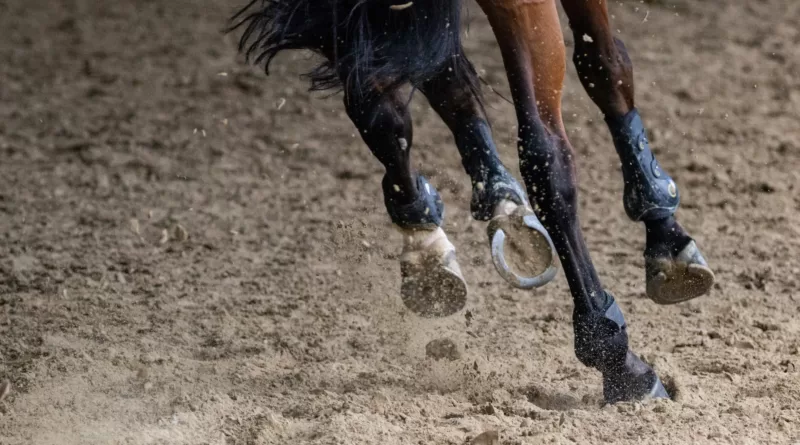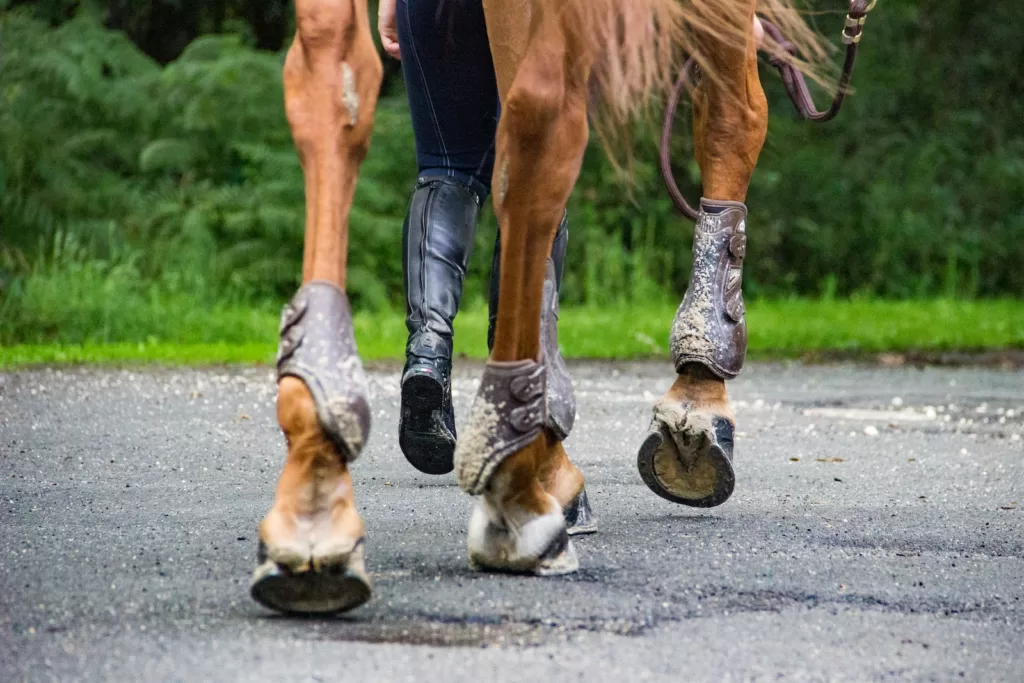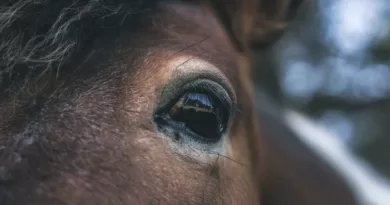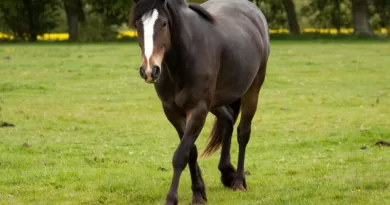How Long Can a Horse Live with Ringbone: Insights and FAQs
If you’re a horse owner or simply have an interest in equine health, you’ve likely come across the term “ringbone.” This condition, which affects a horse’s hooves, can be concerning, and one of the most pressing questions you may have is, “How long can a horse live with ringbone?”
In this comprehensive guide, we’ll delve into the world of ringbone in horses. We’ll explore the longevity of horses with ringbone, discuss treatment options, and answer some frequently asked questions to ensure you have a well-rounded understanding of this common equine ailment.
Understanding Ringbone in Horses
Before we address the crucial question of a horse’s lifespan with ringbone, let’s first grasp what ringbone is and how it affects our equine companions.
What is Ringbone?
Ringbone, also known as osteoarthritis of the pastern or coffin joint, is a degenerative joint disease that primarily affects a horse’s pastern and coffin joints in the lower limbs. It is characterized by the development of bony growths or exostoses around these joints. These growths can be seen and felt, often resembling bony rings – hence the name “ringbone.”
Types of Ringbone
There are two main types of ringbone:
- High Ringbone: High ringbone occurs in the pastern joint (proximal interphalangeal joint), which is the joint between the long and short pastern bones. This type is usually less severe and may cause mild lameness.
- Low Ringbone: Low ringbone affects the coffin joint (distal interphalangeal joint), which is located closer to the hoof. Low ringbone tends to be more problematic and can result in more pronounced lameness.
How Does Ringbone Develop?
Ringbone typically develops due to repeated stress and strain on the affected joint over time. This stress can be caused by various factors, including:
- Conformational Issues: Horses with certain conformational defects may be more prone to developing ringbone.
- Excessive Exercise: Intense and repetitive exercise can put excessive strain on the joints.
- Age: Older horses are more susceptible to ringbone as joint degeneration is a natural part of aging.
- Previous Injuries: Trauma or injuries to the joint can increase the risk of ringbone.
- Breed Predisposition: Some horse breeds are genetically predisposed to ringbone.
Can a Horse Live a Normal Life with Ringbone?
Now, let’s address one of the most pressing questions: can a horse live a normal life with ringbone?
The short answer is yes, but it depends on several factors, including the severity of the condition, the horse’s age, and the chosen treatment options.
Factors That Influence a Horse’s Longevity with Ringbone
- Severity of the Condition: The degree of lameness and the extent of joint damage play a significant role in determining a horse’s prognosis. Mild cases of ringbone may be manageable, while severe cases can pose more challenges.
- Age: Younger horses frequently exhibit a higher likelihood of successfully adapting to ringbone and effectively managing the condition, in contrast to older horses, whose joints may have already experienced compromise due to age-related changes.
- Management and Treatment: Proper management and treatment can greatly impact a horse’s quality of life with ringbone. We’ll delve into treatment options in detail later in this guide.
- Individual Variation: Every horse is unique, and their ability to cope with ringbone can vary. Some horses may tolerate the condition better than others.
See Also: How long do horses live? Amazing Facts About Horses’ Life
Frequently Asked Questions About a Horse’s Lifespan with Ringbone
To provide a well-rounded understanding of this topic, let’s address some frequently asked questions regarding a horse’s lifespan with ringbone:
1. Can a horse with ringbone still be ridden?
Yes, depending on the severity of the condition and the horse’s response to treatment, some horses with ringbone can continue to enjoy riding. However, it’s crucial to collaborate closely with a veterinarian and potentially involve a farrier to ensure the horse’s comfort and well-being throughout their riding activities.
2. Are there any specific breeds more prone to ringbone?
While ringbone can affect any horse, certain breeds may be more predisposed due to their conformation or genetic factors. For example, Thoroughbreds and Warmbloods often carry a higher risk.
3. How is ringbone diagnosed?
Diagnosing ringbone typically involves a combination of physical examination, X-rays, and possibly joint fluid analysis. Veterinarians will assess the horse’s lameness and use diagnostic tools to confirm the presence and severity of ringbone.
4. Can ringbone be cured, or is it a lifelong condition?
Generally, veterinarians consider ringbone a progressive and degenerative condition. While horse owners can manage it, there is currently no cure for ringbone. Treatment focuses on relieving pain, reducing inflammation, and improving the horse’s quality of life.
5. What are the treatment options for ringbone?
Treatment options for ringbone may include rest, non-steroidal anti-inflammatory drugs (NSAIDs), joint injections, corrective shoeing, and in some cases, surgery. The choice of treatment depends on the horse’s specific condition and the veterinarian’s recommendations.
6. Is euthanasia a consideration for horses with severe ringbone?
In some extreme cases, when a horse endures unmanageable pain and experiences a severely compromised quality of life, horse owners may contemplate euthanasia as a humane option. This decision should always involve consulting a veterinarian and thoroughly exploring all available treatment options.
Treatment Options for Ringbone
As mentioned earlier, the severity of the condition plays a significant role in determining a horse’s longevity with ringbone. Let’s explore some common treatment options that can help manage the condition and improve a horse’s quality of life.
1. Rest and Reduced Activity: For mild cases of ringbone, a period of rest and reduced activity may be recommended. This can help alleviate pain and allow the horse’s body to naturally heal to some extent.
2. Non-Steroidal Anti-Inflammatory Drugs (NSAIDs): NSAIDs like phenylbutazone (Bute) are often prescribed to manage pain and reduce inflammation associated with ringbone. These medications can provide relief and improve the horse’s comfort.
3. Joint Injections: Intra-articular joint injections, such as corticosteroids or hyaluronic acid, may be administered to reduce inflammation and pain within the affected joint. These injections can provide temporary relief.
4. Corrective Shoeing: Farriers with experience in treating ringbone can provide customized shoeing solutions to help alleviate pressure on the affected joint and improve the horse’s gait.
5. Nutritional Supplements: Some horse owners explore the use of nutritional supplements like glucosamine and chondroitin sulfate to support joint health. While not a cure, these supplements may offer some benefit.
6. Surgery: In cases of severe ringbone where other treatments are ineffective, surgical options such as joint fusion or joint debridement may be considered. These procedures aim to stabilize the joint and reduce pain.
7. Alternative Therapies: Some horse owners also explore alternative therapies like acupuncture, chiropractic care, and herbal remedies to complement traditional treatments.
Emphasizing the importance of consulting with a qualified veterinarian, one should always make the choice of treatment in collaboration with them. They will assess the horse’s individual condition and provide guidance on the most suitable approach.
Maximizing Quality of Life
While ringbone is a challenging condition, many horses can continue to live happy and fulfilling lives with proper management and care. Here are some tips to help maximize a horse’s quality of life when dealing with ringbone:
- Regular Veterinary Check-Ups: Schedule regular check-ups with your veterinarian to monitor the progression of the condition and adjust the treatment plan as needed.
- Proper Nutrition: Ensure your horse receives a balanced diet that supports joint health. Your veterinarian or equine nutritionist can provide guidance on the appropriate feed and supplements.
- Appropriate Exercise: Work with your veterinarian to create an exercise plan that suits your horse’s condition. Gentle, low-impact activities can help maintain muscle tone and joint mobility.
- Comfortable Living Environment: Provide a comfortable and safe living environment for your horse. Soft bedding and well-maintained stalls or paddocks can reduce the risk of further injury.
- Pain Management: Administer prescribed medications and treatments as recommended by your veterinarian to manage pain effectively.
- Farrier and Shoeing Care: Regular visits from a knowledgeable farrier can make a significant difference in managing ringbone. Customized shoeing can provide much-needed support and comfort.
- Observe Your Horse: Pay close attention to your horse’s behavior and movement. Promptly address changes in gait, posture, or signs of discomfort.
- Maintain a Supportive Network: Seek advice and support from fellow horse owners, support groups, and online communities. Sharing experiences and knowledge can be valuable.
Conclusion
In conclusion, the question of “how long can a horse live with ringbone” is a complex one. The answer depends on various factors, including the severity of the condition, the age of the horse, and the chosen treatment options. While ringbone is a progressive and degenerative condition with no cure, many horses can live fulfilling lives with proper management and care.
If you suspect your horse may have ringbone or if you’re dealing with this condition, it’s essential to consult with a qualified veterinarian who can provide a tailored treatment plan. With the right approach, dedication, and support, your horse can continue to enjoy a good quality of life despite the challenges posed by how long can a horse live with ringbone.
If you have more questions or would like to share your experiences with ringbone in horses, please feel free to leave a comment below. Your insights and stories can be valuable to others facing similar situations. Together, we can support our equine companions and ensure they lead happy and comfortable lives.
Enjoyed this article? You May Also Like:
- Learn in 5 minutes about Cryotherapy for Horses
- Penicillin in Horses; Impeccable Guide in 10 minutes
- Excede Antibiotic For Horses, Fantastic Facts in 5 minutes
- The Science of Oxytocin in Horses: How This Hormone Influences Equine Behavior
- Can Horses Swim? Everything You Need To Know About Horse Swimming






